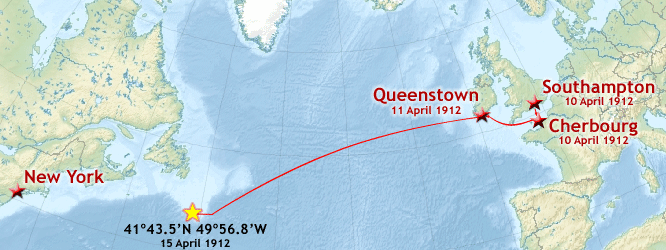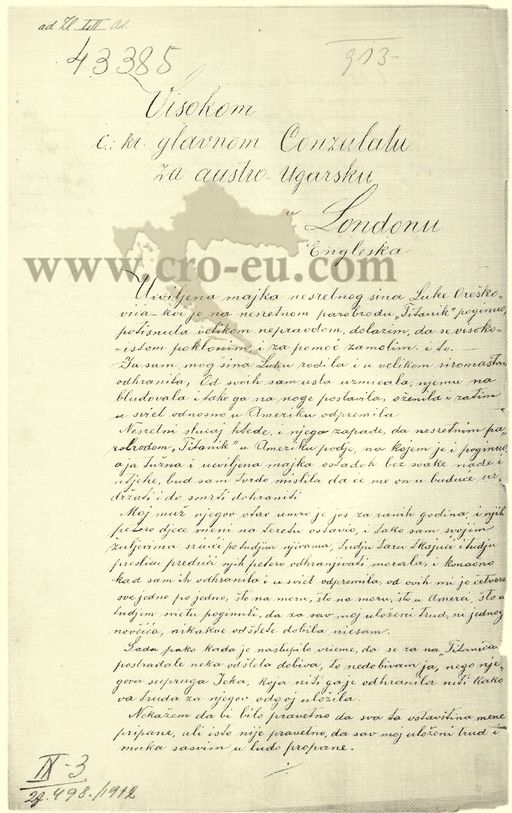Did you know that thirty of Titanic's passengers were Croatian? TCN pays a tribute to fifteen emigrants from Lika who lost their lives in the tragic wreckage on January 31, 2018
The Titanic disaster will always be remembered as one of the most tragic accidents in history. On 14 April 1912, Titanic collided with an iceberg in the Atlantic Ocean around 11:40 in the evening. Moments later, the ship was inspected for damage, and it was soon established she was about to sink. The crew hurried to send out SOS calls, while the passengers gathered on deck, boarding the lifeboats and attempting to abandon ship in any way possible. Titanic sank around 02:20.
While everyone surely knows about the course of events described above, here's a lesser known fact: among 1324 passengers on board at the moment of collision with the infamous iceberg, 31 were Croatian, half of the group composed of emigrants from the region of Lika who set off for the US hoping to find jobs to support their struggling families at home. Between 1900 and 1910, more than 30.000 people left Lika in search of a better future, leaving behind their family cooperatives that were drowning in debt at the turn of the century. The mentioned decade saw the largest wave of emigration from Lika to the US, with the cited number of 30.000 inhabitants making for one fifth of the total Croatian emigrating population at the time.
Fifteen people from Lika thus headed to the French port of Cherbourg, where Titanic made the first stop on its way from Southampton to New York to pick up 274 people, mostly third class passengers. All thirty emigrants from Croatia boarded in Cherbourg; as the ship was too large to dock in the port, the newcomers were taken to Titanic on the auxiliary ship Nomadic. They made another stop in Queenstown the following day, then headed across the Atlantic Ocean where their journey was cut short.

Seeing that Croatian territory was a part of Austria-Hungary in 1912, Titanic's passenger list cites all Croatian passengers as Austrian citizens. None of them survived the catastrophe and they are all considered missing to this day.
Historical documentation bearing witness to this tragedy can be found at the State Archives in Zagreb, in two separate collections. The fund named Emigrational Commissariat includes a list of passengers who drowned in shipwreck, their families' requests for compensation, and court hearing transcripts. The fund of the Royal Croatian-Slavonian-Dalmatian Land Government for the period between 1912 and 1914 includes press clippings about the departed Croatian passengers, reports on their lives, families and work, and compensation requests submitted to the Royal Government by family cooperatives from Lika.
The content of surviving documents is nothing short of heartbreaking, evoking a vivid notion of real human lives and stories behind the statistics. When we talk about any devastating event in numbers - thousands of people, hundreds dying - we're painting a comprehensive picture of tragedy, but often fail to remember every single person among the victims had a home, a loving family and a drive to overcome challenging living conditions. And even though every death in the Titanic case was undoubtedly a tragic loss, not everyone on board was there for a comfortable cruise across the ocean. While the first class was enjoying a luxurious journey, having a splendid time in Titanic's restaurants and salons, the majority of her passengers shared a common goal - getting to America, a promised land where they just might get a chance to find work and support their families back home. The thought of those people having met their untimely end in the freezing waters of the Atlantic only gets more soul-crushing when you remember why they embarked on that journey in the first place.
Emigration is no less depressing these days, but at least we have modern technology and a somewhat better starting point on our side; we dispose of information, speak a foreign language or two, have a basic grasp on the place we're headed for. It must have taken true grit to leave your homeland at the beginning of the 20th century and depart for a faceless, enigmatic country, with the only information available being the uncertain promise of a more rewarding future. With that in mind, we wanted to share a couple of stories of the unfortunate Croatians who didn't live to reach the US coast.

A report containing a press clipping on the Croatian passengers / CRO-eu forum
The following list features names of emigrants from Lika who died in the Titanic wreckage, along with their places of origin:
1. Grgo Čačić - Široka Kula
2. Luka Čačić - Široka Kula
3. Mara Čačić - Široka Kula
4. Manda Čačić - Široka Kula
5. Luka Orešković - Široka Kula
6. Mara Orešković - Široka Kula
7. Jeka Orešković - Široka Kula
8. Ivan Strilić - Široka Kula
9. Mate Pocrnić - Bukovac (Perušić)
10. Tomo Pocrnić - Bukovac (Perušić)
11. Joso Ćulumović - Prvan selo (Perušić)
12. Petar Čalić - Brezik (Gospić)
13. Jovo Čalić - Brezik (Gospić)
14. Jovan Dimić - Ostrvica (Gospić)
15. Mile Smiljanić - Pisać (Udbina)
All fifteen unfortunate passengers were fairly young, most of them in their twenties. The youngest passenger from Lika was Joso Ćulumović from Prvan selo, aged 17; he headed to the US determined to provide for the nine members of his struggling cooperative. After Joso's death, his co-op was left with a debt of 600 crowns they borrowed to send Joso overseas.
The oldest was the 39-year-old Luka Čačić from Široka Kula who left behind his elderly parents, his wife Ana, and nine young children. Documents show Čačić was a farmer and the president of his family cooperative which disposed of a house with 9 acres of land, two horses, three oxen and seven sheep. Luka had no personal assets at the time he died.
Tomo Pocrnić from Bukovac died at the age of 24. He was also a co-op president who took care of his mother Jela, his two siblings, his wife and two young children. The co-op borrowed money to purchase a Titanic ticket for Tomo, hoping he would be able to support his struggling family in Lika with his hard work in the US.
Ivan Strilić from Široka Kula was aged 27 when he boarded Titanic. He left behind a 2-year-old son and a pregnant wife, along with his elderly parents in poor health who were physically unable to tend to their land and procure funds required to pay off the debt for his ticket.
Documents also show there was a sixteenth passenger, one whose life was spared by a pure stroke of luck. According to a letter sent from the parish of St. Matthew in Široka Kula to Gospić, a certain Ivan Nikšić was also supposed to board Titanic in France, but was held back in St. Gallen due to an eye disease. A couple of days later, he boarded another ship and safely made it to Chicago, where he penned a letter to his hometown, saying the American papers published a passenger list from Titanic which mentioned his former neighbours as deceased. This is how the parish priest and the rest of the local community found out about the dire fate of their friends and relatives.
As Titanic was formally owned by White Line Star, a company under the patronage of the British government, families of departed passengers reached out with pleas for financial compensation in the months following the accident. The inhabitants of the listed villages in Lika were living in extreme poverty at the time, and the debt amassed in order to send those fifteen residents to the US only pushed them deeper into despair.

Letter to the Austro-Hungarian consulate in London / CRO-eu forum
And then you get to the letters, sent by widows and mothers from Lika to the Austro-Hungarian consulate in London:
As a grieving mother to my unfortunate son Luka Orešković who died on the Titanic ship, burdened by this great injustice, I come to pay respects [to the consulate] and to ask for help. I gave birth to my son Luka and raised him in great poverty. Everything I had, I gave to him and thus got him on his feet, saw him marry and then set off for America. The unfortunate case had him depart for America on the woeful steamship Titanic, on which he died, leaving this mournful grieving mother with no hope or comfort...
In 1913, the widows and children were the first to be granted a part of the compensation; the remaining sum was split into smaller installments. They got another part of the funds in 1916, and the rest was supposed to be paid out after the end of the war.
Learning about those fifteen lost souls and their personal histories makes the story of Titanic hit closer to home. For a handful of Lika's residents, stricken by grief after having lost their loved ones, any hope for a better life sunk along with the majestic ship. For that reason alone, we think it's worth to remember their names.
The original feature on the unfortunate passengers from Lika was written by Nada Klobučar, Ivica Mataija and the State Archives in Gospić. You can read the story in its entirety (in Croatian) on the CRO-eu forum.


